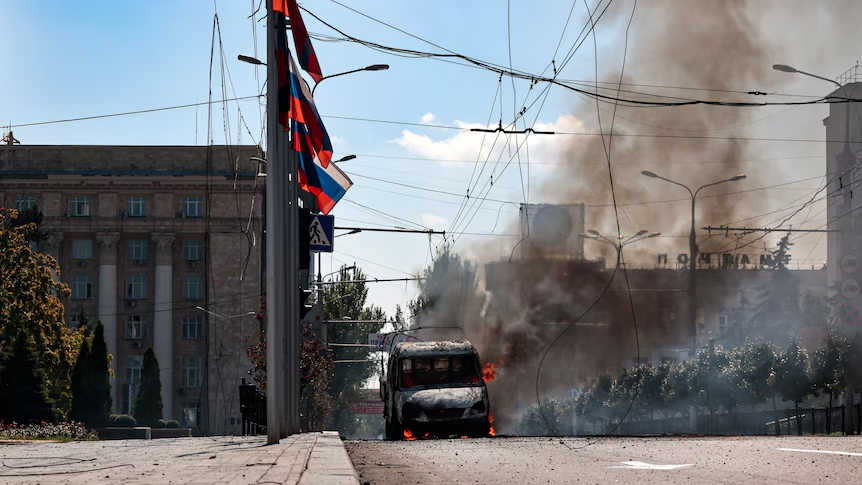Explosive Attacks on Russian Infrastructure Heighten Tensions Amid Ongoing Ukraine Conflict
Significant Infrastructure Damage and Casualties in Russia’s Border Regions
In a series of alarming incidents, two critical bridges in Russia’s border regions with Ukraine were targeted and destroyed, resulting in multiple casualties and raising concerns about escalating violence ahead of peace negotiations. According to Russian authorities, these acts of sabotage have caused the deaths of at least seven individuals and injured 69 others, intensifying fears of a broader conflict.
Details of the Incidents
The first attack occurred late Saturday night in the Bryansk region, where a major toll road bridge spanning a railway was detonated at approximately 10:50 pm local time (1950 GMT). At the time, a passenger train carrying 388 travelers was passing beneath the structure, leading to catastrophic consequences. Witnesses and social media footage depict passengers desperately attempting to escape the wreckage, with some trapped beneath the collapsed bridge and others among the wreckage of damaged carriages along the railway tracks.
Just four hours later, a second explosion targeted a railway bridge in the neighboring Kursk region. This blast also resulted in the destruction of the bridge and caused debris to scatter onto a nearby toll road, which was being used by freight trains. Russian investigators have confirmed that both incidents involved deliberate explosions, with the Investigative Committee explicitly linking the two attacks.
Context of the Attacks and Regional Tensions
The border areas of Russia adjacent to Ukraine have been frequent targets of Ukrainian military operations since Russia’s invasion of Ukraine in February 2022. Both sides accuse each other of targeting civilians and civilian infrastructure, fueling a cycle of retaliation and escalation. The recent attacks come at a particularly sensitive time, just a day before the United States and other international mediators are scheduled to facilitate peace talks in Istanbul aimed at ending the protracted three-year conflict.
Ukraine has yet to officially comment on the recent explosions. However, Ukrainian military intelligence reported that a Russian military cargo train was derailed near Yakymivka, a settlement in the Russian-controlled part of Ukraine’s Zaporizhzhia region, following an explosion. The Ukrainian authorities did not claim responsibility but highlighted ongoing sabotage activities attributed to Ukrainian forces.
Accusations of Sabotage and Political Reactions
Russian officials have swiftly attributed the attacks to Ukrainian sabotage operations, framing them as deliberate efforts to undermine peace negotiations. Andrei Kartapolov, the chairman of the defense committee in Russia’s lower parliament, publicly stated that these acts are “clearly the work of Ukrainian special services,” designed to derail diplomatic efforts and provoke further hostility. He emphasized that such actions aim to harden Russia’s stance and incite aggression, but assured that they would not succeed in their objectives.
President Vladimir Putin was briefed on the incidents by Russia’s Federal Security Service (FSB) and the Emergency Ministry, with discussions also held with Bryansk’s governor, Alexander Bogomaz. The Kremlin has condemned the attacks, viewing them as acts of sabotage intended to destabilize the region.
International Reactions and the Road to Peace
The timing of these attacks is notable, occurring just as diplomatic efforts are underway to bring the conflict to a close. The United States has called for renewed peace negotiations, with President Donald Trump urging both Russia and Ukraine to engage in dialogue and warning that failure to do so could lead to increased sanctions and further escalation.
Meanwhile, the war continues to intensify on the battlefield. Both Russian and Ukrainian forces are actively deploying drones and conducting offensives along key frontlines in eastern Ukraine. Ukraine has expressed reluctance to participate in the upcoming peace talks, citing a desire to review Russia’s proposals first, while U.S. lawmakers have warned Moscow of the potential for harsher sanctions if negotiations falter.
The Broader Impact and Future Outlook
These recent incidents underscore the fragile state of regional stability and the complex dynamics at play in the ongoing conflict. As both sides accuse each other of aggression and sabotage, the international community remains cautious, emphasizing the importance of diplomatic solutions amid rising military tensions.
The situation continues to evolve, with experts warning that such acts of sabotage could lead to a broader escalation if not addressed through constructive dialogue. The coming weeks will be critical in determining whether diplomatic efforts can overcome the current cycle of violence and pave the way toward a sustainable peace in Ukraine and its neighboring regions.

